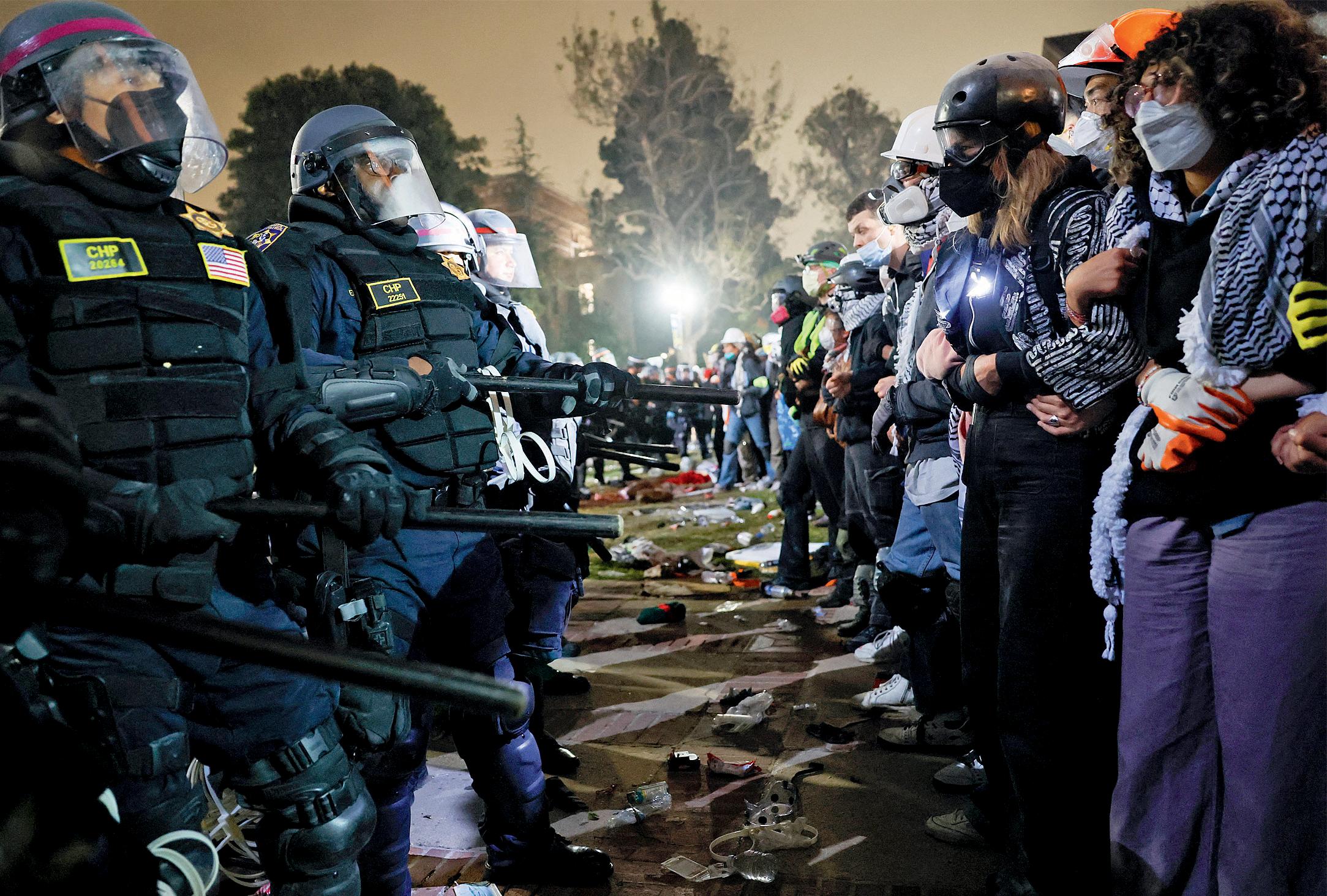
Then, at about four in the morning, she heard helicopters. Later, she awoke to news and footage of a violent attack by pro-Israeli protesters on an encampment set up to oppose the war in Gaza.
"It was hard to watch," said Brown, 19, a freshman at the University of California, Los Angeles, whose dorm was near the encampment. "And I wondered where the police were. I saw posts from people talking about them being teargassed and maced and campus security was just watching."
Eventually, a large police contingent did arrive and forcibly cleared the sprawling encampment. Flash-bangs were launched to disperse crowds gathered outside and more than 200 people were arrested. Afterwards, campus facility workers could be seen picking up flattened tents and pieces of spray-painted plywood, and throwing them into grey dumpsters.
Similar scenes of tumult played out last week at about 40 universities and colleges in America, resulting in clashes with police, mass arrests and a directive from Joe Biden to restore order. The unrest has unfolded from coast to coast on a scale not seen since the Vietnam war protests of the 1960s and 1970s.
The president has cause for concern as the issue threatens his youth vote, divides his Democratic party and gives Donald Trump's Republicans an opening to depict Biden's America as spiralling out of control.
There are inescapable parallels with 1968, a year of assassinations and antiwar demonstrations that led to chaos at the Democratic National Convention in Chicago. Democrats lost the White House to Republican "law and order" candidate Richard Nixon.
Now, there are fears that history will repeat itself as Biden faces Republican "law and order" candidate Trump in November's presidential election. Bernie Sanders, an independent senator from Vermont, told CNN last week: "I am thinking back and other people are making this reference that this may be Biden's Vietnam."
Denne historien er fra May 10, 2024-utgaven av The Guardian Weekly.
Start din 7-dagers gratis prøveperiode på Magzter GOLD for å få tilgang til tusenvis av utvalgte premiumhistorier og 9000+ magasiner og aviser.
Allerede abonnent ? Logg på
Denne historien er fra May 10, 2024-utgaven av The Guardian Weekly.
Start din 7-dagers gratis prøveperiode på Magzter GOLD for å få tilgang til tusenvis av utvalgte premiumhistorier og 9000+ magasiner og aviser.
Allerede abonnent? Logg på

Cutting a dash
Scissor Sisters are reuniting to celebrate 20 years since their debut album. They talk fans, Elton John and connecting with the UK's weird’ energy

How art led resistance to Pakistan's dictatorship
A dazzling exhibitionin Qatar reveals how the repressive regime of Zia-ul-Hag led prompted a powerfulcreative defiance

The death of the middleclass professional spells danger for Labour
What does it mean to have a middle-class, white-collar professional job?

I love travelling Europe by train, but a joined-up approach is needed
Last August, I took the train from Trieste to Ljubljana, following a route once used by the Orient Express.

How will 2025 turn out? The life of Jimmy Carter offers us a clue Jonathan Freedland
How will we look back on 2025? Or, if that seems too absurd a question to ponder just a few days into the new year, how might we view the first quarter of the 21st century? As it happens, the answer to both questions is the same and it was confirmed by an event that came as the old year faded and the new one began.

15 ways to overcome overwhelm
Readers and wellbeing experts share tips on corralling chaos and avoiding anxiety, from journalling to cherishing nature

Overwhelmed? Here's how to fix it
Modern life is exhausting. Here, Guardian writers explain what they have given up to make space in their schedules and lives from social media to makeup to news addiction. Then, readers and experts offer tips on how to navigate the demands and pressures we all face. First, Emine Saner examines why we are so overwhelmed

Seoul standoff Impeached president fights on despite arrest attempt
South Korean anticorruption officials attempting to arrest the country's suspended president, Yoon Suk Yeol, must know by now what he meant by his repeated vows to \"fight to the end\".

'Don't feed the troll': European leaders hit back at Musk
When the German chancellor, Olaf Scholz, was asked in an interview about the barrage of insults being directed at him and other German leaders by Elon Musk, the world's richest man, his reply was: \"Don't feed the troll.\"

History lessons The two steps that could stop societal collapse
Academic Danilo Brozović says studies of failed civilisations all point in one direction-the need for radical transformation to survive